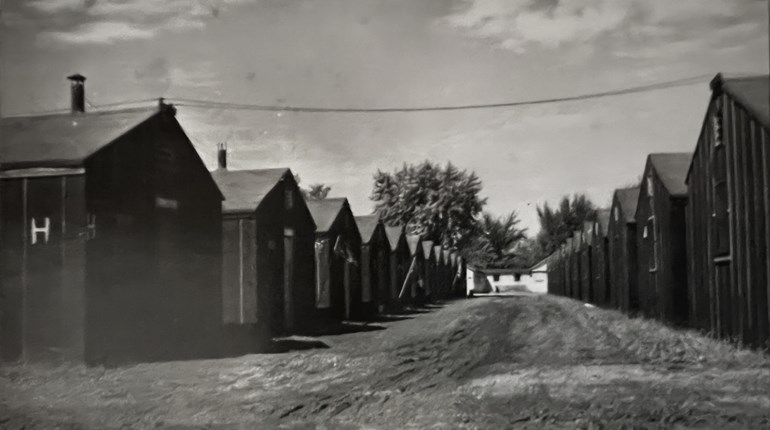
Bathed as we are in media, it’s getting more and more difficult to remember that it wasn’t always so. When and if we do, it’s harder still to recall that technologies we now take for granted, and particularly the wireless forms with a visual component, lagged years or even decades behind their invention. Audio-only radio was king for roughly half the 140 years since James Clerk Maxwell’s theory of electromagnetism made it all possible.

In a perverse but oft-repeated turn, tyrants and traitors loved Maxwell’s work, or at least the inventions of those who built on it (like Bose, Popov and Marconi). The tyrants are well known: Adolf Hitler and Hideki Tojo. Less so are the two American women who were the “voice talent” in their schemes, the first of whom went on trial for treason 66 years ago this week.
Mildred Gillars was born in Portland, Maine, in 1900. She had long sought a career in the public eye, studying dramatic arts at Ohio Wesleyan University and Hunter College, and working off and on in vaudeville during the 1920s. By the late ’20s, she was following her dream back and forth across the Atlantic, first to France, then Algeria, and by 1934 to Dresden, Germany. She studied music, and taught English in Berlin’s famous Berlitz School of Languages. At 40, she became an announcer at RRG, the German State radio network.
With tensions running high between Germany and the United States by 1941, the State Department advised Americans to leave the Nazi-controlled country. Engaged to a German national (who would shortly die on the Russian/Eastern front), Gillars chose to remain. When Germany’s alliance with Japan became well-known in the wake of the Pearl Harbor attack, she denounced the Eastern ally, belatedly realizing that her criticism could mean internment in a concentration camp. She recanted her criticism with a written oath to Germany, and rehabilitated her reputation through Max Otto Koischwitz, a German-born former professor with whom she had been romantically involved while attending Hunter College back in the United States.
Under Koischwitz, and beginning in roughly March of 1943, Gillars would finally achieve the notoriety she sought. In a series of three radio shows—the last of which was broadcast only two days before VE Day—she would play popular American music mingled with anti-Jewish rhetoric and gloomy propaganda (“Midge at the Mike,” 1943); insinuate serial infidelities by soldiers’ sweethearts and wives, leavened with more defeatist musings (“Home Sweet Home,” from December 1942 until May 1945); “GI’s Letterbox” and “Medical Reports,” in 1944. These often consisted of interviews with captured and wounded GIs, but heavily edited to produce seemingly sympathetic reports of Nazi aims as well as their treatment of POWs.
“… Beginning in roughly March of 1943, Gillars would finally achieve the notoriety she sought.”
GIs were understandably skeptical of anything they heard on German broadcasts, and coined various names for Gillars. The one that eventually stuck was “Axis Sally.” Still, Koischwitz was extremely skilled, and Gillars’ broadcasts contained enough disconcerting detail of American and service life that she did genuine harm.
Koischwitz did not survive the war (he died of tuberculosis and heart failure in Berlin, August 1944), but Gillars continued until the end. Following the German surrender in May of 1945, she went into hiding, but in no way had her work for the Nazis gone unnoticed: The U.S. attorney general dispatched a prosecutor to Berlin with orders to find and arrest her. Ten months later, she was finally in custody, though nearly three years to the day would pass before she was convicted on one of eight counts of treason after a six-week trial. Her sentence—10 to 30 years and a $10,000 fine—was upheld on appeal in 1950.
Gillars served 12 years of her sentence, and was released on parole in June 1961. During her years in the Federal Women’s Reformatory at Alderson, W.Va., she had become a Roman Catholic, and returned to Ohio upon her release. She lived in a convent in Columbus while teaching German, French and music. In 1973, she finished her degree at Ohio Wesleyan. She died in 1988.
Half a world away, Iva Toguri began a similarly peculiar journey. Born in 1916 to Japanese immigrants in California, she was a Girl Scout and a high school and college graduate (UCLA, 1940 or 1941). Her parents sent her to Japan in 1941 to visit an ailing aunt, and delays in documentation left her trapped in Japan after Pearl Harbor. Japanese officials demanded that she renounce her American citizenship, but she refused. At 25, and 5,500 miles from home, Iva Toguri was declared an enemy alien, and denied even the means to feed herself.
Toguri eventually found work as a typist in both a Japanese news agency and for Radio Tokyo. In November 1943, Allied prisoners of war were forced to broadcast propaganda, and Toguri’s fluent English lead superiors to select her to host a one-hour radio show called The Zero Hour. In her producer, an Australian army major named Charles Cousens (who had been captured during the fall of Singapore), Toguri found an ally such as Gillars had in Max Otto Koischwitz. Unlike Gillars, however, Toguri, Cousens and U.S. Army Captain Wallace Ince engaged in subtle sabotage of Zero Hour scripts from the outset. Their Japanese captors never deciphered their double entendres and satire (later analysis would conclude that The Zero Hour had slight positive effects on Allied morale). From a meager salary of $7/month, Toguri smuggled food and medicine into the prison camps where she conducted “interviews.” In 340 broadcasts, she never used the name “Tokyo Rose.”“Japanese officials demanded that Toguri renounce her American citizenship, but she refused.”
With the war’s end in August 1945, Toguri renewed her efforts to return to the United States. She responded to an advertisement by Cosmopolitan magazine and the International News Service that offered $2,000 for an “exclusive” interview with Tokyo Rose—a name applied by Allied troops generically to any female propaganda broadcaster. Instead of the promised payment, Cosmopolitan’s Harry Brundidge tried to sell Toguri’s interview as a confession. On Sept. 5, 1945, she was arrested.
Over the next 10 years, Toguri would be abused and railroaded. Neither General Douglas MacArthur’s staff nor the FBI could find any evidence she had aided the Japanese, and released her in October 1946. Two years would elapse before she once again returned to California, though it was as a prisoner once more. Radio host and gossip columnist Walter Winchell spoke out against her, and President Truman wanted to set an example: Federal prosecutors eventually charged her with eight counts of treason. Like Gillars, she was convicted on a single count, fined $10,000 and sentenced to 10 years at Alderson. Following her parole in 1956, Toguri moved to Chicago.
It took 20 more years for justice to catch up with Toguri. Ron Yates, a Chicago Tribune reporter who began investigating her case in 1976, soon discovered that the two primary witnesses against her had been coached and coerced for their testimony. Shortly thereafter, President Gerald R. Ford pardoned her, and restored her citizenship (lost due to the treason conviction).
Shortly before her death in 2006 at age 90, Toguri received the Edward J. Herlihy Citizenship Award from the World War II Veterans Committee. In a BBC report, Yates recalled Toguri saying the day was the most memorable of her life.

































